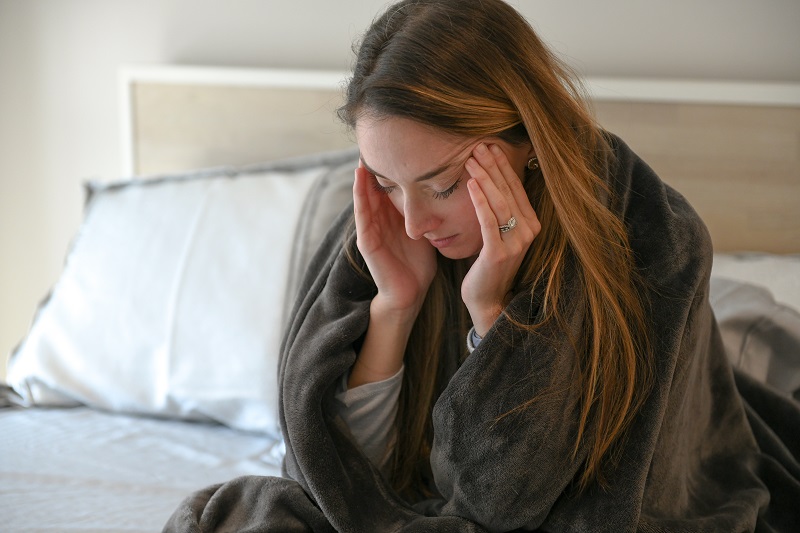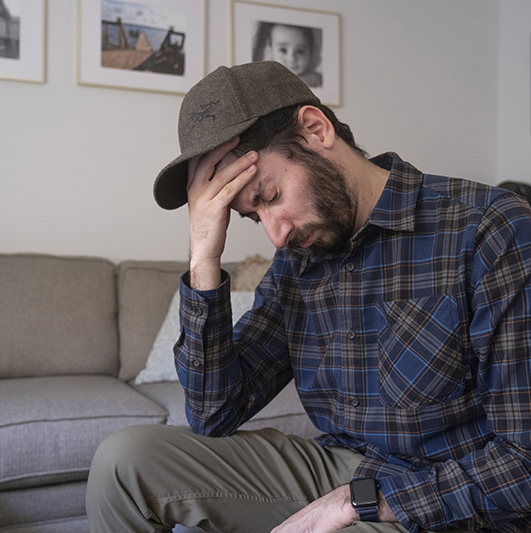Can COVID-19 Cause Migraines?

July 21, 2022
Headaches are among the most frequent symptoms reported by people infected with COVID-19, and also among people contending with “long COVID” cases in which some health complaints persist for weeks or months after the illness passes. Worse, people who already were dealing with migraines prior to COVID infection often report that their symptoms grow worse after getting COVID.
A 2021 study in The Journal of Headache and Pain indicates that headaches last longer post-COVID, and that migraine patients were increasing their use of pain-relieving drugs to mitigate the headaches’ severity. A different study in the same journal showed more than half of migraine patients reported that after getting COVID, their headache frequency increased; nearly two-thirds reported increased severity.

“The last thing anybody needs during this pandemic is for their migraines to get worse, but unfortunately, that’s exactly what’s happening,” says neurologist and headache medicine specialist, Monte B. Pellmar, M.D.
Finding Migraine Relief
Try to avoid common triggers of migraines:
- Try to manage your stress level through meditation or other relaxation techniques.
- Avoid excessive caffeine and limit alcohol intake.
- Regular sleep habits and avoid skipping meals.
- Quit smoking.
Migraine specific abortives and preventatives can be part of the solution, but migraine sufferers should not over utilize even over-the-counter pain relievers since it can result in increased headache frequency.
“Other than too frequent use of both over-the-counter and prescription medications,
a healthy lifestyle and help from a physician prescribing a variety of preventative medications can improve your quality of life,” says Dr. Pellmar.
There are many treatment options that may prevent migraines, such as anti-seizure medicine, antidepressants, blood pressure medicine, Botox, CGRP-peptide inhibitors as well as a number of neuro stimulators.
“Contending with intensified migraines, on top of the other challenges of the pandemic and of COVID-19 infection, can feel like an unworkable burden,” says Dr. Pellmar. “As doctors’ understanding grows regarding COVID-19 and the role it plays in causing or exacerbating headaches, so will patients’ relief from one of COVID’s unpleasant side effects.”
Next Steps & Resources:
- Meet our source: Monte B. Pellmar, M.D.
- To make an appointment with Dr. Pellmar or a provider near you, call 800-822-8905 or visit our website.
- Learn about headache and migraine treatments at Hackensack Meridian Health
The material provided through HealthU is intended to be used as general information only and should not replace the advice of your physician. Always consult your physician for individual care.
Find a doctor near me
Types of Headaches Explained by a Neurologist

Understand headache types. Neurologist Dr. Gerhardstein explains migraines, tension, and cluster headaches. JFK University Medical Center offers care. Call 800-822-8905.
Can COVID Cause Insomnia?

COVID-19 causing insomnia? Dr. Pristas explains how pandemic stress affects sleep. Learn tips for better sleep; improve your rest tonight.
Find a doctor near me

Could the Cause of Your Headaches Be Digital Eye Strain?
It’s 3 p.m., and you start to feel a dull ache behind your eyes. You’ve noticed this happens most weekdays when you’re at work. Once you get home and rest on the couch, the headache vanishes.

Can You Get COVID Twice?
Can You Get COVID Twice? Learn about COVID-19 reinfection from Drs. Nehmad and Unuigbe. Get the facts and stay safe. Call 800-822-8905.

5 Things Only Migraine Sufferers Understand
Understand migraine pain? Learn 5 things only migraine sufferers know from Dr. Krel. Find relief and resources. Call 800-822-8905.

Exposed to COVID? Here’s When to Get Tested
COVID-19 exposure? Learn when to get tested. Doctors Fleischman and Cicogna offer guidance and next steps. Call 800-822-8905.
